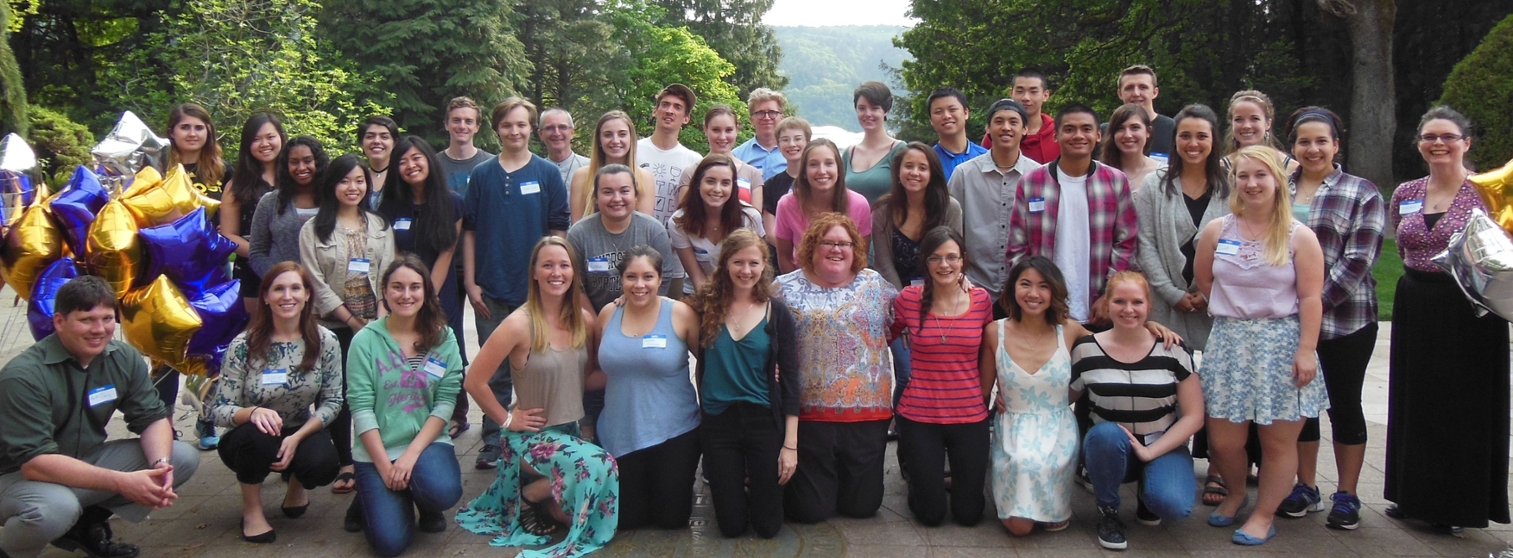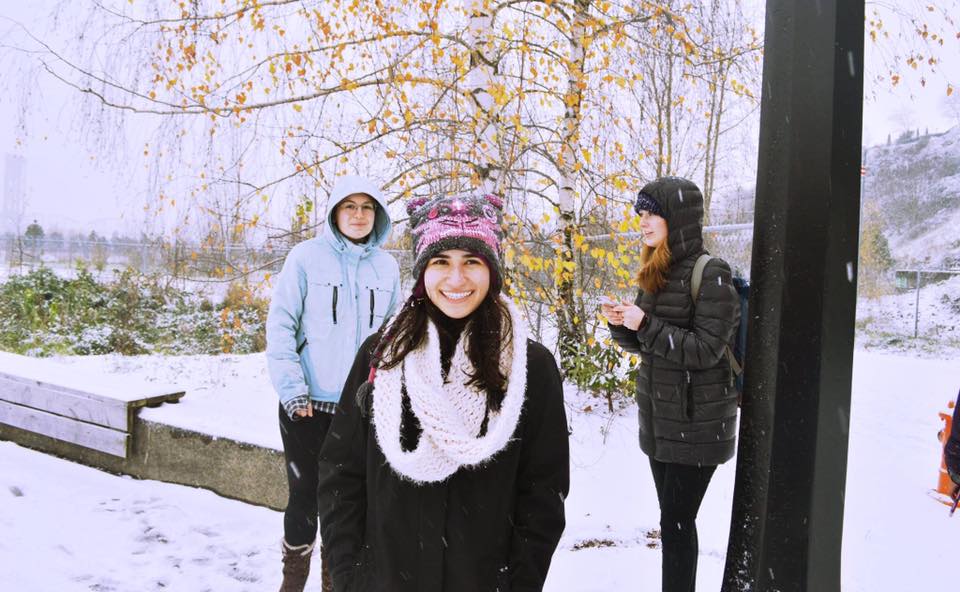

What was it like being among the first in your family to go to college? Tell us about your story, and what you think has helped you succeed so far at UP?
While academia offered me enriching and formative experiences, this part of myself, became difficult to reconcile with my status as a first-generation college student from a tight-knit Mexican family. As I was getting ready to move out of state for college my aunts, uncles, and grandparents expressed their anxieties that I would not be safe on my own, I would stop practicing Catholicism, and that I would no longer fulfill my duties as a member of the family due to the pursuit of my own personal endeavors. My grandmother constantly and anxiously reminds me that she is praying for me. Her innocence and ignorance of what my day-to-day life is like feeds her faith, forcing her to lean upon her Higher Power. She looks for Oregon on the globe my mom gifted her to see where her granddaughter lives. It seems not that far from Oxnard, California, her barrio, when she sees it from this perspective. Sometimes I look for Oxnard on a map as well. There’s no other place in the world like Oxnard. There’s no other place in the world where my family is and keeps coming back and keeps becoming discovered. Although I lived most of my life in a suburban city, there is no other place where everyone I know knows everyone and where I have all of my roots sunken into the ground. Whenever I visit my abuelos, tíos, tías, primos, and primas, blood-related and not, in Oxnard, I’m aware of what my mom and my dad and I have done by cutting ourselves off by the stem, replanting, receiving otros tipos de alimentos, by moving two hours away to a different Southern California town, and now to a different state. When I visit Oxnard, I see my self as an outsider, who sticks out like a sore thumb, who is privileged and attended a high school with a high graduation rate, who traveled to different countries to pursue academia, who has to now learn Spanish to be able to communicate with her familia. But every time I come back to Oxnard I am reminded that I also have the right to call this place home. I am grateful to have people who support me there, a culture that sustains me, and a family who makes me proud to be Chicana. This sense of community I have been gifted fuels me on my path to continue my studies and become a physician. As a physician I will acknowledge the need for cultural diversity in health care and devote myself to addressing social determinants of health. Along with my family, education, extracurricular activities, and experiences abroad have shaped me to be who I am. Acceptance of this generational and cultural gap between my relatives and I has allowed me to appreciate the positive aspects of my culture and be confident in establishing my own identity. My collectivism has evolved and inspires me to seek not only to treat individuals, but to heal communities.
What does it mean for you to be a part of the FGEN community and to be a FGEN Student Ambassador at UP?
I know there are students out there like my FGEN friend who’s parents dropped them off alone on move-in day, not understanding that this is a day for parents to help the student transition into college life, while everyone else had parents to assist them. I know there are students like me who trusted their parents with handling loans and financial aid simply because they are more financially experienced, when it actually turned out that both my parents and I have a lot to learn about the financial obstacles of pursuing a college degree. I know there are people like my other FGEN friend who does not receive financial support from their parents and is unable to legally work in the US. As an FGEN student, it is implied in our nature that we are full of hope and determination. I hope to encourage students to be hungry for resources and connections just like they are hungry for education. I know I have so much to learn from other FGEN experiences, strength, and wisdom, and I look forward to being inspired by the incoming students.
What is your advice to FGEN students at UP who are facing challenges?
Some of my biggest challenges involved asking for help. It took me a long time to incorporate visiting professors in office hours every week into my schedule. I had to learn how to work with others on coursework most days of the week to help improve my understanding of the course material, and get over my fear of looking dumb in front of people who seemed to know exactly what to do. I think many FGEN students are used to thinking that they are alone in their experiences or in fact they have undergone many of their obstacles alone and came out the other side alive. It may be tempting to try to tackle college that way as well, but just like learning new course work or a new skill, taking advantage of campus resources is something that must be practiced and can be mastered. My advice to first gen students would be to take it one step at a time. See yourself as worthy of help and worth the investment. We spend so much of our life considering our family’s needs and desires, and while this has its role in fostering a community, we have to learn how to seek our own growth. Whatever challenges you are facing, know that while you may still need to consider your families’ needs, you too are a member of that family and you must do what is best for you. You may feel you might disappoint people you love if you take a break, if you need to ask for help, if you make financial mistakes, if you prioritize your own goals over those of what people have in mind for you. You most likely will only make people proud by showing you have the courage to evolve.
Has a mentor played a role in your experience at UP? How so?
Dr. McShane, my Bioethics professor was an FGEN college student and shared with me how she still battles with Imposter Syndrome. She has shown me that we should be going to any length to advocate for ourselves even when we are taking advantage of based on our gender, race, or sexual orientation. Her openness and vulnerability with her students impacted me so much that it changed how I viewed helping others like me. By sharing her story with me, she empowered me to be open with others and that my experiences were valid, even if other people did not understand them. I also have been mentored by Dr. Raul Ruiz, founder of Future Physician Leaders. Dr. Ruiz was the first to inspire me to address social determinants of health as a physician and to also pursue an education in public health. Dr. Raul Ruiz, first generation Mexican-American, physician, and congressman, taught me that the minority identity can actually be a strength in the pursuit of my goals. Even though I may not have the resources that other students have, the work ethic I learned from my parents and grandparents and the connection I feel to my communities are strong motivators that accelerate me toward my goal.
What resources have been significant, meaningful, or helpful for you during your UP experience?
The University of Portland Moreau Center runs various service-learning immersions, and I was fortunate enough to participate in the rural and the border immersions where I learned about immigration history, the current dangers of being a minority immigrant in this country, and the social health determinant of being a migrant worker. Through this experience I was able to understand deeper historical patterns behind migration, such as the role of capitalism, international conflict, labor shortages, anti-communist ideologies, and racial discrimination. I now understand how immigration policy has evolved over time (and reverted backwards), and what role it plays in my own family history. Both my paternal and maternal grandparents immigrated to the United States in the 1950’s and happened to arrive during a peaceful time in history in regard to allowing the easy documentation of immigrants. My privilege as a third-generation Mexican-American could be traced to the good fortune that my grandparents were alive when they were, crossed the border when they did, and were allowed a healthy and happy life they could pass on to their children and grandchildren. I am better able to understand my place in this timeline and the importance of keeping this knowledge alive. This experience helped me to understand my identity and inspired me to use my knowledge and my voice to speak out against injustices done to families like mine every day through American immigration policies. Many of the realities my FGEN peers and I have to face are extremely overwhelming. Attending therapy sessions at the Health and Counseling center as well as attending FGEN and Latinx Student Union events has been extremely important to my development, while I process what it means to be a minority student at the University of Portland, and as I seek community in a time of my life where I am exploring who I am away from my tight-knit collectivist family.
Connect with Sarah